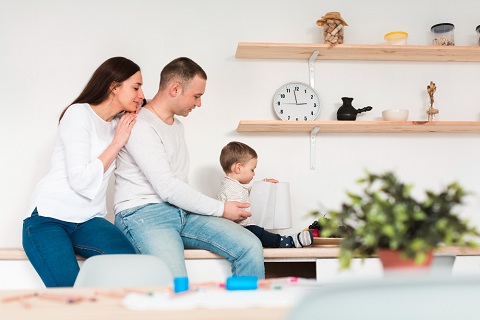Parenting is one of the most rewarding yet challenging journeys in life. Creating a positive parenting environment is essential for fostering healthy child development, nurturing strong parent-child relationships, and promoting overall family well-being. By establishing a supportive and nurturing atmosphere, parents can cultivate a sense of security, trust, and happiness within the family unit. In this article, we’ll explore practical strategies and tips for creating a positive parenting environment that fosters growth, resilience, and harmony.
Cultivate Open Communication:
Effective communication is the cornerstone of a positive parenting environment. Encourage open and honest dialogue between parents and children, where everyone feels heard, valued, and respected. Take the time to listen actively to your children’s thoughts, feelings, and concerns without judgment or criticism. Create opportunities for family discussions, where everyone has the chance to express themselves and share their perspectives. By fostering open communication, parents can strengthen bonds with their children and build trust and understanding within the family.
Establish Clear Expectations and Boundaries:
Setting clear expectations and boundaries is essential for creating a structured and harmonious parenting environment. Clearly communicate family rules, routines, and behavioral expectations with your children, and consistently reinforce them with positive reinforcement and consequences when necessary. Establishing firm but fair boundaries helps children understand acceptable behavior and promotes a sense of security and stability within the family. Be consistent with enforcing rules and boundaries to promote accountability and discipline while maintaining a supportive and nurturing atmosphere.
Promote Positive Reinforcement:
Positive reinforcement is a powerful tool for encouraging desired behaviors and fostering a positive parenting environment. Acknowledge and praise your children for their accomplishments, efforts, and positive behaviors to reinforce their self-esteem and confidence. Celebrate their successes, no matter how small, and offer encouragement and support during challenging times. Focus on strengths and progress rather than shortcomings or mistakes, and use constructive feedback to help children learn and grow. By emphasizing positivity and encouragement, parents can motivate and inspire their children to reach their full potential.
Lead by Example:
Parents serve as role models for their children, and their behavior sets the tone for the family environment. Lead by example by demonstrating kindness, empathy, and respect in your interactions with others, including your children. Practice active listening, patience, and understanding in your communication and problem-solving approaches. Show appreciation and gratitude for your children’s contributions and efforts, and model healthy coping strategies for managing stress and emotions. By modeling positive behaviors and attitudes, parents can instill important values and skills in their children and create a nurturing and supportive family environment.
Encourage Independence and Autonomy:
Fostering independence and autonomy is crucial for promoting confidence, self-reliance, and resilience in children. Encourage your children to make age-appropriate decisions, solve problems, and take on responsibilities around the home. Offer guidance and support as needed, but allow them the freedom to explore and learn from their experiences. Encouraging independence helps children develop important life skills and build self-confidence, while also fostering a sense of empowerment and ownership in their actions and choices.
Create Quality Family Time:
Spending quality time together as a family is essential for building strong bonds and creating cherished memories. Make an effort to carve out dedicated family time each week for shared activities, such as family dinners, game nights, or outdoor adventures. Engage in meaningful conversations, laughter, and bonding activities that strengthen relationships and foster a sense of belonging within the family. Prioritize family time as a valuable opportunity to connect, recharge, and nurture the parent-child bond.
Practice Empathy and Understanding:
Empathy and understanding are essential qualities for fostering compassion, connection, and emotional intelligence in children. Take the time to validate your children’s feelings and emotions, even if you don’t always agree with them. Show empathy and understanding by putting yourself in their shoes and acknowledging their perspectives and experiences. Create a safe and supportive space where children feel comfortable expressing their feelings and emotions without fear of judgment or ridicule. By practicing empathy and understanding, parents can strengthen their relationships with their children and cultivate a compassionate and emotionally supportive parenting environment.
Encourage Healthy Expression of Emotions:
Emotions are a natural and essential part of the human experience, and teaching children how to express and manage their emotions effectively is critical for their overall well-being. Encourage healthy expression of emotions by validating and acknowledging your children’s feelings, whether they’re positive or negative. Teach them healthy coping strategies for managing stress, anger, and sadness, such as deep breathing, journaling, or physical activity. Create a non-judgmental space where children feel safe to express themselves openly and seek support when needed.
Prioritize Self-Care:
Parenting can be demanding and exhausting, and prioritizing self-care is essential for maintaining a positive parenting environment. Take time for yourself to recharge and rejuvenate, whether it’s through exercise, hobbies, or relaxation activities. Practice self-compassion and forgiveness, and don’t be afraid to ask for help or support when needed. Remember that taking care of your own well-being allows you to show up as the best parent possible for your children and create a positive and nurturing family environment.
Seek Support and Resources:
Parenting is a journey filled with challenges and uncertainties, and seeking support and resources can help navigate the ups and downs along the way. Reach out to trusted friends, family members, or parenting groups for advice, encouragement, and solidarity. Take advantage of parenting books, online forums, or professional counseling services for additional guidance and support. Remember that you’re not alone in your parenting journey, and there are resources and support systems available to help you create a positive and nurturing environment for your family.
Conclusion:
Creating a positive parenting environment is essential for fostering healthy child development, nurturing strong parent-child relationships, and promoting overall family well-being. By cultivating open communication, establishing clear expectations and boundaries, promoting positive reinforcement, leading by example, encouraging independence, creating quality family time, practicing empathy and understanding, encouraging healthy expression of emotions, prioritizing self-care, and seeking support and resources, parents can create a nurturing and supportive environment where children thrive and flourish. Embrace these strategies and tips to cultivate a positive parenting environment that fosters growth, resilience, and happiness for the entire family.




